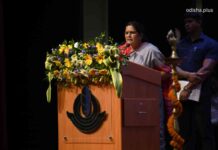by Professor Ujjwal K Chowdhury
Interim government of Maharashtra headed by Devendra Fadnavis and Ajit Pawar formed through a fateful night, some nights ago, has ceased to exist today with the top two shenanigans submitting resignation. The stage is set for a non-BJP government. What are the lessons from this month long drama full of intrigue and twists?

First, on the Constitution Day, the Supreme Court stood by constitutional values and decided to order floor test within tomorrow evening and that too an open ballot on camera ensuring complete transparency. As the Court decided this, Fadnavis and his deputy the rebel NCP leader Ajit Pawar both resigned showing how ill planned was their move. This gives hope to the citizens on the role of the Judiciary.
Second, it was a total theatre of absurd with villains on all sides, and no true heroes, from the start. Shiv Sena fought the polls as a junior partner of BJP, but post elections, wanted 50-50 share of power “as discussed earlier”, they said. NCP took lead to form government with Sena but wavered when Congress did not give letter of support. Congress was non-committal initially and now after pressures from their state unit, the High Command has yielded to a Sena led opposition government. And BJP went ahead to form a farcical government secretively in the middle of the night with PM using his extraordinary powers to revoke President’s rule.

Third, the gubernatorial bias and irrelevance of the post of the British Raj like Governor in 21st century has once again been exposed. In spite of the Constitution clearly noting that the Governor must fully be assured that those who are claiming to form the government do have the numbers behind them, the Governor, who was a former BJP central minister, yielded to pressures or was himself a party to this midnight drama that made a mockery of his constitutional position, which went right up to the top, to that of the President. Serious questions are raised on the predatory and biased role of the Governors and their political misuse right from the times of Indira Gandhi till this date during Modi. Nation needs to rethink on the need of Governors but only a multi-party central government with no overwhelming power of any one man/party can initiate an amendment in this context.

Fourth, there is no ideology of political parties today. Ideology is almost history. Sena loses Hindutva outlook typing up with Congress, NCP and Congress lose their anti communal plank tying up with Sena, and BJP loses its anti corruption rhetoric tying up with someone whom they called fountain-head of corruption, Ajit Pawar. Hence, the lesson is that we are in an era of adjustments, compromises, and Common Minimum Programs focussing on welfare and governance of the moment.

Fifth, the claim of being unblemished and free from corruption done by BJP for a long time stands busted today. The PM used his extraordinary powers to revoke President’s Rule in Maharashtra without a cabinet meeting, it was ratified by the President at 5am, to be put in to action by Maharashtra Governor and oath taking happened before 8 am, inducting Fadnavis as CM Ajit Pawar as Deputy CM, same Pawar against whom Fadnavis government has been carrying on an investigation of corruption charges to the tune of Rs.70,000 crores. And nine such major charges were dropped by the Anti Corruption Bureau within two days of Pawar taking Deputy CM’s charge! The entire thing rakes of suspicion and corruption. This is apart from the issue of BJP allegedly buying legislators’ support in Karnataka, Goa, Manipur, et al.
Sixth, resort and hotel politics has come to stay. After every election, wherever there is no clear or a wafer thin majority, the issue of ‘safeguarding’ the opposition MLAs has come to occupy centre stage in media and public mind. Then various parties hoard their legislators in different hotels within or beyond their states and this has become a permanent feature as seen in Goa, Karnataka, and now Maharashtra. Such things did happen in the past but was a rarity, and today in ModiShah-era, it is a regularity. And it makes a mockery of politics and mandate.
Seventh, India has an anti-defection law by which if a group of legislators wish to break-away from their party, they have to be one-third or more of the total elected members of that party in that House (central or state). So, while retail defection is prevented, wholesale is allowed. Time has come to disallow any defection by any elected member. One can resign, or a party can decide in totality to align with another or move away from an alliance. But individual legislators, one or few or many, on their own should not be allowed to defect.
Eighth, there is a lesson also for the media. Unfortunately, the larger section of Indian media has become lapdog of the ruling parties and called this midnight misadventure a masterstroke, an oft repeated and abused word in recent times. Also, chanakya-neeti has been used for blatant use of investigative agencies like ED and CBI and glaring offers and buying-out of support of MLAs. Media needs to be the watch dog and must resolutely stand to question those in power, whoever they may be, in whichever government. In spite of obvious irregularities in this case, media rather lauded the ‘speed’ at which a government was stealthily installed.

Ninth, the opposition can take the lesson of united work with a Common Minimum Program, going ahead, and re-strategize in different states if it has to give a strong rebuttal to what it calls the anti-people measures and economy failures of the Modi government. A pro people role in the opposition led state governments ill set an example for the people to consider. Absence of viable and resolute opposition shall only push India to one-party autocracy, for which the opposition will remain equally responsible as the ruling party. The Maharashtra rebuttal must inject some spirit in the opposition camp.
Tenth, it is interesting to note that at least one MLA of Maharashtra was there who was not contacted by anyone, who is the poorest MLA in Maharashtra and still was not open to be sold, who did not appear in any hotel, and who was silently working for his constituency even after results. He is Vinod Nikole, CPI(M) MLA from Dahanu, who has a declared asset of Rs.52,000 only, the least among all MLAs. So, it does not need billions to serve the hungry millions selflessly. It needs an intention, and a firm one.
The author is a regular columnist, television commentator, and Pro Vice Chancellor of Adamas University in Kolkata.

























